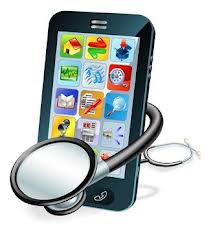 Healthcare Apps
Healthcare Apps
In the very recent past, it seems as though the whole world went mobile. Starting with basic car phones, then on to cell phones, and then finally the move to smartphones, technology has carved out better and better ways for people to stay connected on the fly.
The creation of instant-access technology has only fueled the desire of society to have it. Now, people expect to be able to interact instantly with businesses, social networks, and even their healthcare providers. If they can’t, then they are more likely than ever to find a company, network, or provider that does offer those capabilities.
The Importance of Apps for the Healthcare Industry
Both Medicare and Medicaid offer Electronic Health Records Incentive Programs that reward medical professionals and hospitals who successfully adopt and use EHR technology with incentive payments.From all sides, it seems, doctors and hospitals are receiving adamant requests to embrace and provide interactivity.
Implementing an EHR system, becoming active on social media platforms, and maintaining an interactive, informative website are all excellent steps toward meeting this growing demand. However, more and more people are utilizing their smartphones on the go and at home, and that means they want apps they can use instead of having to engage their phone’s browser.
The Perfect Apps for Doctors and Hospitals
The truth is, there is no one perfect app for every doctor, hospital or practice out there. Furthermore, even though apps have become such an important part of patient interactivity, it doesn’t mean that their development is a breeze. Healthcare professionals in particular must be extremely careful with regard to security measures in order to protect patient confidentiality and comply with HIPPA standards.
In addition, each unique practice must decide which options it wants to afford its patients and which are less important. You don’t want to develop an app so large that it causes problems and freezing on your patients’ phones, but you also don’t want to offer so few features that there’s no point in installing it.
Most practitioners and hospitals do agree on a few features that should be standard: ability to send and receive secure messages, access to patient records, and easy access to contact information. Some practices may like to include an appointment scheduler or reminder, while others may not. Here are a few examples of excellent doctor and hospital apps that you can use to decide what your perfect app will look like:
- The Mayo Clinic’s Patient—Just about everyone’s familiar with the Mayo Clinic, but the size of the health system can be beyond overwhelming to patients and visitors. This app is designed to make it all a little less intimidating for everyone. It offers maps and navigation around campus, as well as access to medical records, appointment schedulers, and more.
- Pembroke Pines Foot & Ankle — We thought this practice’s app made an excellent example of what a good doctor’s office app should be. In addition to offering options to schedule appointments and interact with the doctor, it’s got a huge FAQ and patient resource section. It also allows for electronic check-in for appointments and helps minimize paperwork for patients.
- Boston Children’s Hospital MyWay — Here’s another hospital app from a well-known healthcare system. It has similar features to the Mayo Clinic’s hospital app, but a very different feel. We’re including it here so that you can see how apps can have similar functionality without looking like they came out of a cookie-cutter development machine.
If you’re going to develop an app for your practice, which is highly recommended, take some time to find out what features are important to your patients. Hire a reputable app developer and treat the project like the investment that it is. Remember, incentives await you for becoming more interactive, and your patients will love you all the more for making yourself, and their records, more accessible.
About the Author: Michelle Rebecca is a blogger and freelancer, who currently writes for various medical institutions, including de Ramon Plastic Surgery. She’s written about almost every topic under the sun, and loves constantly learning about new subjects and industries while she’s writing. Follow her on Google+.
